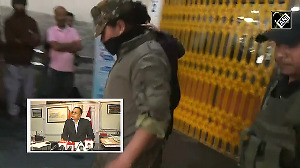CBI sources said Thursday that the Union Home Ministry has referred 10 riot cases, including those related to Tytler, Kumar and Shastri, to it. "We will see whether the cases registered by Delhi Police after the riots should be reopened or investigated by CBI.
"Thereafter, the CBI will decide what appropriate action should be taken," the sources said. The Nanavati Commission, which had probed the 1984 anti-Sikh riots, had suggested in its report to the government to examine whether cases against Tytler, Kumar and Shastri could be looked into.
The Prime Minister had also promised that the government would reopen cases against those whose names figured in the Nanavati Commission report in which an adverse inference had been drawn about their conduct or behaviour. "Our government stands committed to do all that we can humanly do to go to the root of the problem, that all those individuals about whom the Commission has drawn adverse inferences, suggestions and recommendations, we will have a re-look at them," he said.
As part of the Prime Minister's commitment, the Union Home Ministry went into the Nanavati Commission's report, which had drawn certain adverse inferences against some Congress leaders and sought the Law Ministry's view on the issue. The Commission's report was tabled in Parliament during the Monsoon Session. The Nanavati Commission indicted Tytler saying there was "credible evidence" against him, that he "very probably" had a hand in organising attacks and demanded that government take "further action as may be necessary". Tytler resigned as Union Minister shortly after the report was presented in Parliament.
The 339-page report of the Commission had also pointed fingers at several local Congress leaders including Sajjan Kumar, Shastri and H K L Bhagat. It had, however, absolved the party saying there was no evidence to suggest that former Prime Minister Rajiv Gandhi or any other high-ranking leader had "suggested or organised" the attacks in which nearly 3,000 people were killed.
The sources said the affidavits filed against three Congress leaders were likely to be looked afresh by CBI. Delhi Police has not been involved as the commission has observed that there was "colossal failure" of law and order in the capital at that time. On the role of Sajjan Kumar in the riots that followed the assassination of Prime Minister Indira Gandhi, the Commission recommended examination of only those cases where the witnesses had made accusations against him specifically. "There is credible material" against Kumar and another Congress leader Balwan Khokar that they were "probably involved as alleged by witnesses", the Commission said.
However, the Action Taken Report of the government on the Commission's findings rejected the recommendation against Tytler saying, "It is clear from the remarks 'very probably' that the Commission itself was not absolutely sure about his involvement in such attacks."
The Commission was of the view that there was "credible evidence" against Shastri and recommended that the government examine the relevant material and direct investigation or further investigation as may be found necessary. Pointing out that Shastri was not named as an accused in this case, the ATR said the government would examine the factual position for appropriate action. The Commission also came down heavily on the failure of the Delhi Police and also criticised the role of the then Police Commissioner S C Tandon and the then Lieutenant Governor of Delhi P G Gavai.
The ATR said the goverment had taken immediate administrative action. "Gavai was replaced by M M K Wali as LG of Delhi on November 4, 1984," it added. On action against Tandon and other policemen, the ATR said there were legal difficulties in taking departmental action against retired government servants.
"However, the government would examine this matter further in consultation with the Ministry of Law for appropriate action," the ATR said. On the issue of a probe being launched against those from the police, the sources said no decision has yet been taken. Two committees set up by the Home Ministry to examine the aspects of compensation for the killing of the Sikh and giving jobs to the next of the kin of those who died, were likely to submit their reports in the next few days.





